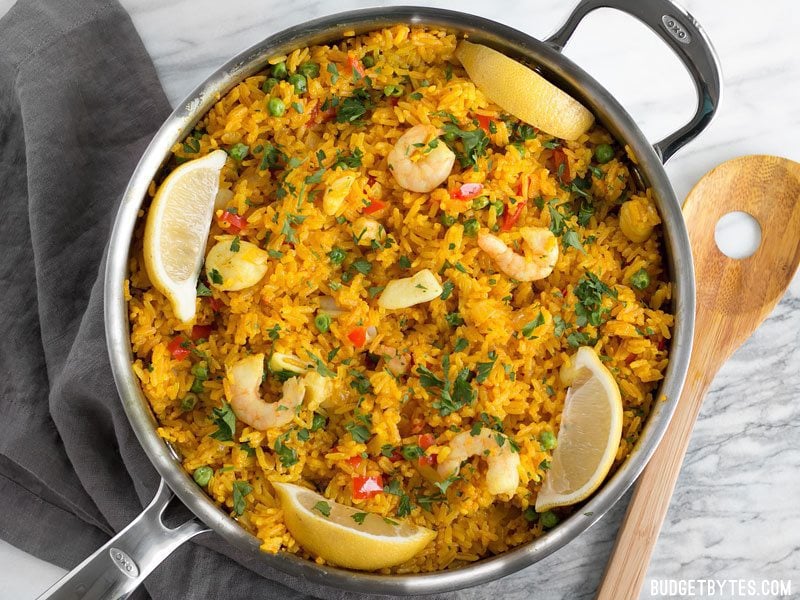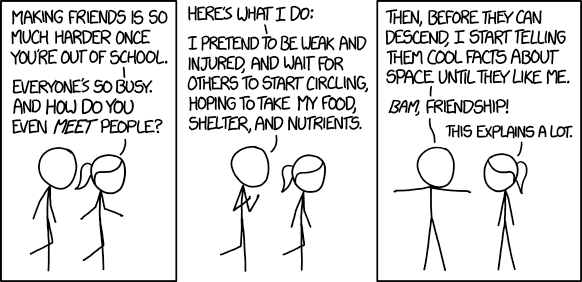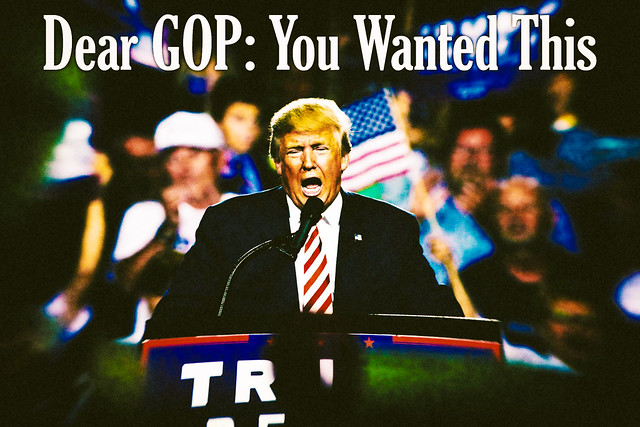Yesterday I wrote here:
If Trump’s administration indulges in the racism, sexism and religious and other bigotries that Trump and his people have already promised to engage in, we can assume it’s because his voters are just fine with that racism, sexism and religious and other bigotries — even if they claim to have voted for him for other reasons entirely. After all, Trump didn’t hide these things about himself, or try to sneak these plans in by a side door. They were in full view this entire time. If you vote for a bigot who has bigoted plans, you need to be aware of what that says about you, and your complicity in those plans.
I also last night tweeted this:
And wouldn’t you know, because of both, I’ve gotten comments and emails and tweets from people upset that I pointed out that voting for a public racist with clear racist policies means that one is abetting racism. I assume that they know for sure that they’re not racist, and wouldn’t be racist, so being accused of racism stings. They didn’t vote for racism! They voted to make America great again!
Well, so, okay. Let me give you an analogy here.
Let’s say you want HBO. So you go to your local cable provider to get HBO and the only way they’ll let you get HBO is to sign up for a premium channel package, which includes HBO but also includes Cinemax. Now, maybe you don’t want Cinemax, and you don’t care about Cinemax, and maybe never personally plan to ever watch Cinemax, but the deal is: If you want HBO, you have to sign on to Cinemax too. You have to be a Cinemax subscriber to get HBO. And you go ahead and sign up for the premium channel package.
Pop quiz: In this scenario, did you just subscribe to Cinemax?
And you may say, no, I subscribed to HBO, but I couldn’t get it without Cinemax. I’m an HBO subscriber, not a Cinemax subscriber.
And then someone points out to you, well, in point of fact, you are a Cinemax subscriber, look, there it is on your TV channel guide. Some of the money you pay in for your premium channel package goes to Cinemax and funds its plans and strategies.
And you say, but I never watch Cinemax or ever plan to.
And they say, okay, but you still subscribe to it, and you knew that in order to get HBO you had to get Cinemax, and you signed on anyway. You’re a Cinemax subscriber whether you ever watch it or not.
And you say, well, look, I really wanted HBO.
And they say, sure, enough that you were fine with accepting Cinemax to get it. Just don’t pretend you’re not currently subscribing to Cinemax, too. You clearly are. Look, it’s right there on your cable bill. You’re a Cinemax subscriber.
Now, to bring that analogy back to the point at hand. This election, you had two major Presidential providers. One offered you the Stronger Together plan, and the other offered you the Make America Great Again plan. You chose the Make America Great Again plan. The thing is, the Make America Great Again has in its package active, institutionalized racism (also active, institutionalized sexism. And as it happens, active, institutionalized homophobia). And you know it does, because the people who bundled up the Make America Great Again package not only told you it was there, they made it one of the plan’s big selling points.
And you voted for it anyway.
So did you vote for racism?
You sure did.
And you say, but I’m not racist, and I would never treat people in a racist fashion, and I don’t like being called out as having done a racist thing.
And others say to you, okay, but you knew that when you signed up for the Make America Great Again plan that active, institutionalized racism was part of the package. Your vote supports racism. By voting, you endorsed a racist plan.
And you say, but I didn’t want that part. I wanted the other parts.
And others say to you, that’s fine, but you knew that to get the other parts, you had to sign on for the racism, too. And evidently you were okay with that.
And you say, no I’m not, I hate racism.
And others say to you, but apparently you like these other things more than you hate racism, because you agreed to the racism in order to get these other things.
And you say, well, the Stronger Together plan had horrible things in it too.
And others say to you, yes, and you didn’t vote for that, you voted for this. Which has racism in it. You voted for racism.
And you say, stop saying that.
And the others ask, why.
I’ve written before on how people can benefit from racism and other forms of discrimination without actively and intentionally discriminating against others, and if you have the time I recommend reading the piece. Lots of people benefit from an institutionalized system of bigotry, etc (including me) without being a bigot themselves, i.e., going out of their way to keep other people down. That’s the nature of a bigoted system so endemic that you don’t even notice it’s there for the same reason the proverbial fish doesn’t notice the water.
I think you can very easily make the argument that a lot people who voted for Trump are not and would not actively be racist to another person in their day-to-day lives. I live among Trump voters, and the ones I live among are lovely and kind and perfect neighbors. They are what nearly anyone would describe as good people, me included. As are, I think, the majority of the people who voted for Trump.
But the fact remains that in voting for Trump, they voted for racism: It was right there in the package deal, front and center, and hard to miss. They voted for it anyway. And you may argue that voting for racism as part of a larger package deal does not a racist make, and I wouldn’t necessarily disagree, as far as what people do to others in their personal and day to day lives. But voting for racism will make personal, day-to-day life harder for the targets of that racism. Two days after the election, we’re already seeing that.
It’s perfectly fine to point out to people who voted for racism, that indeed, this is what they voted for. And also that if owning up to the fact that they voted for racism is uncomfortable for them, they should take a moment to think about how bad it is for the targets of that racism, and how bad it has yet to get.
For the Trump voters, Trump’s racism may have been just part of the package deal, the Cinemax they had accept to get the HBO. For those who are the target of that racism (and sexism, and homophobia), however, it’s not Cinemax. It’s their lives. Day to day, and every day. And they’re all too aware of what Trump voters signed up for, to get what they wanted.




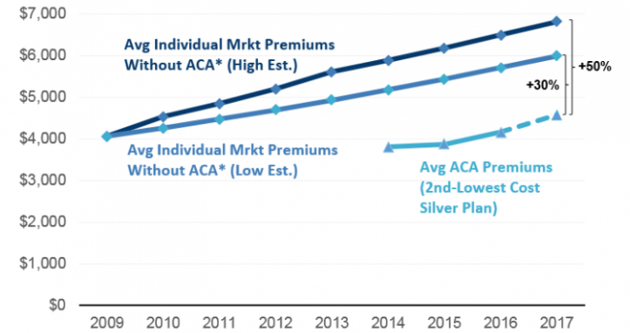



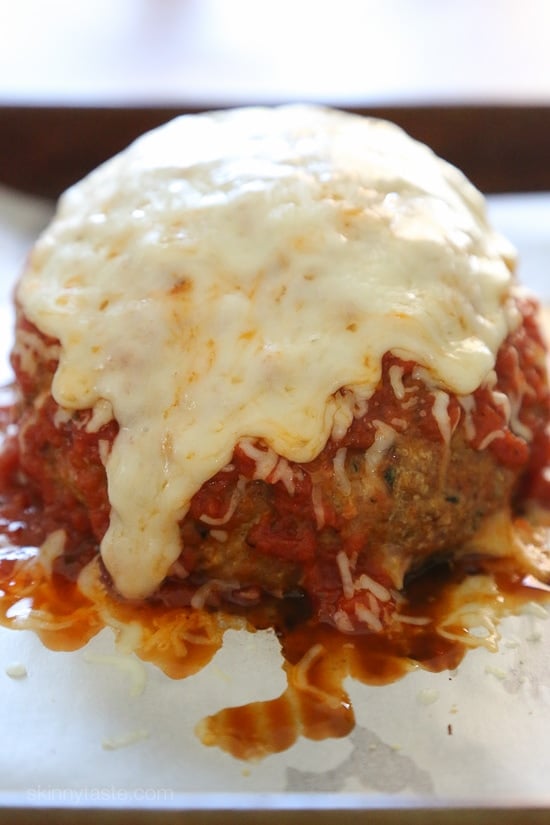











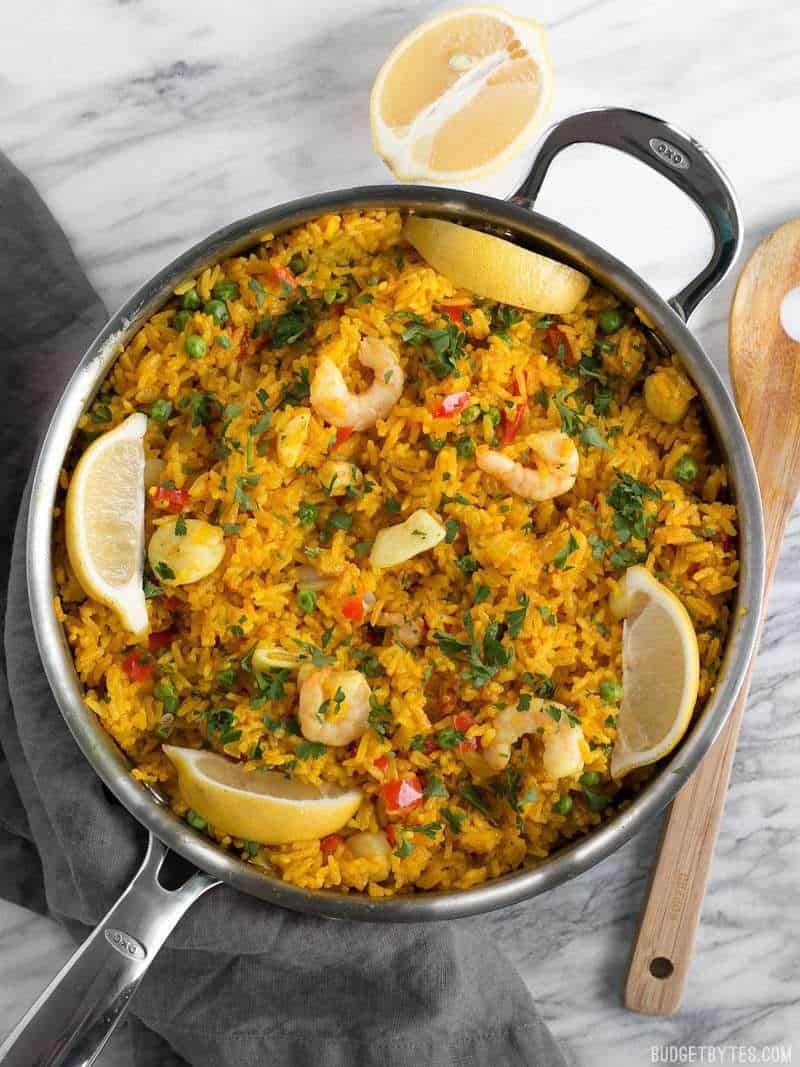


 Begin by dicing one onion and mincing two cloves of garlic. Add the onion and garlic to a large deep skillet along with 2 Tbsp olive oil. Sauté the onion and garlic until the onion are soft and transparent.
Begin by dicing one onion and mincing two cloves of garlic. Add the onion and garlic to a large deep skillet along with 2 Tbsp olive oil. Sauté the onion and garlic until the onion are soft and transparent. While the onion and garlic are sautéing, dice a red bell pepper. Add the bell pepper to the skillet and continue to sauté for 1-2 minutes more.
While the onion and garlic are sautéing, dice a red bell pepper. Add the bell pepper to the skillet and continue to sauté for 1-2 minutes more. Add 2 cups uncooked long grain white rice, 1/2 Tbsp turmeric, 1 tsp smoked paprika, and 1/4 tsp cayenne pepper.
Add 2 cups uncooked long grain white rice, 1/2 Tbsp turmeric, 1 tsp smoked paprika, and 1/4 tsp cayenne pepper. Stir until everything is well coated in spices.
Stir until everything is well coated in spices. Add 3 cups chicken broth to the skillet, place a lid on top, and turn the heat up to high. Let the skillet come to a boil. Once it reaches a boil, turn the heat down to low and let simmer on low for 15 minutes.
Add 3 cups chicken broth to the skillet, place a lid on top, and turn the heat up to high. Let the skillet come to a boil. Once it reaches a boil, turn the heat down to low and let simmer on low for 15 minutes. This is the seafood blend that I used. It’s a mix of shrimp, scallops, and calamari. I used half of this bag, or 1/2 lb. If you can’t find something similar to this, you can use just shrimp.
This is the seafood blend that I used. It’s a mix of shrimp, scallops, and calamari. I used half of this bag, or 1/2 lb. If you can’t find something similar to this, you can use just shrimp. After simmering on low for 15 minutes, most of the broth should be absorbed by the rice. Add 1/2 lb. of the frozen seafood mix and 1 cup frozen peas. Seafood cooks very quickly, even from frozen, so you don’t want to add it before the rice is cooked. Over cooking seafood makes it very tough.
After simmering on low for 15 minutes, most of the broth should be absorbed by the rice. Add 1/2 lb. of the frozen seafood mix and 1 cup frozen peas. Seafood cooks very quickly, even from frozen, so you don’t want to add it before the rice is cooked. Over cooking seafood makes it very tough. Fold the seafood and peas into the cooked rice, place the lid back on top of the skillet, and let it cook over low heat for another 5-10 minutes, or until the shrimp have turned pink and opaque. You may need to stir once half way through to check the doneness of the shrimp buried in the rice.
Fold the seafood and peas into the cooked rice, place the lid back on top of the skillet, and let it cook over low heat for another 5-10 minutes, or until the shrimp have turned pink and opaque. You may need to stir once half way through to check the doneness of the shrimp buried in the rice.  One the seafood is cooked through, top the Seafood Rice Skillet with chopped parsley and lemon wedges.
One the seafood is cooked through, top the Seafood Rice Skillet with chopped parsley and lemon wedges.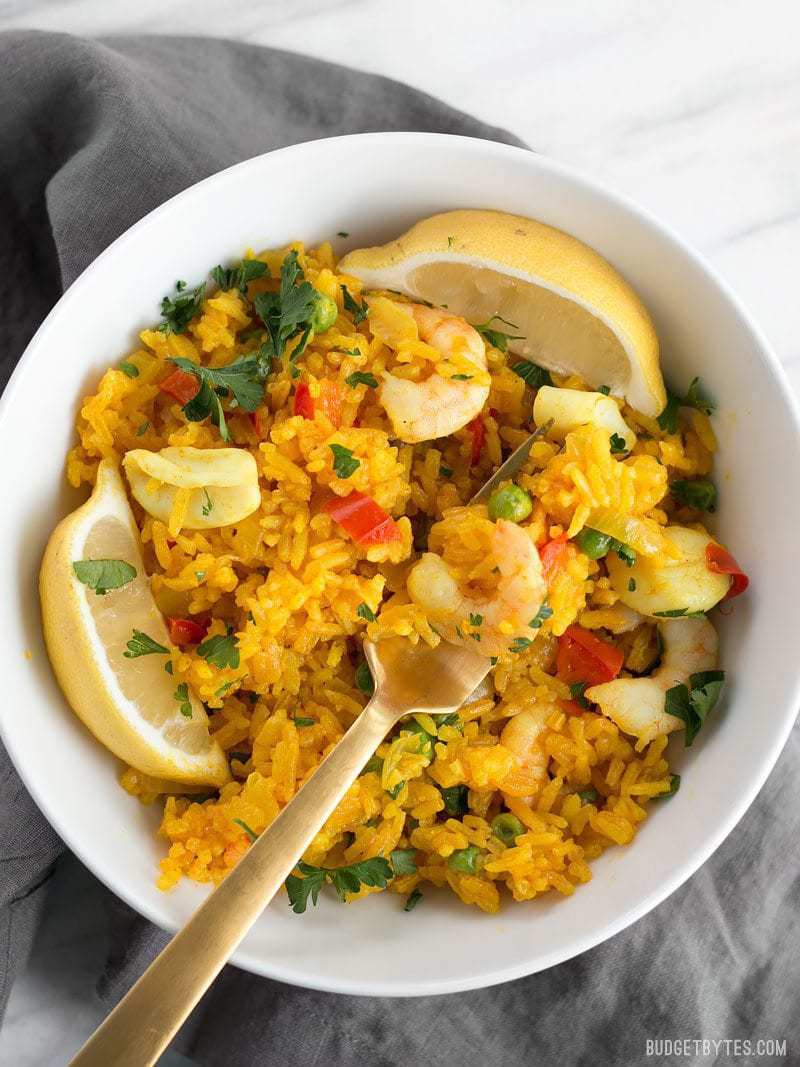 Squeezing fresh lemon over the top of your bowl really gives this dish a nice fresh POP, so don’t skip it! :)
Squeezing fresh lemon over the top of your bowl really gives this dish a nice fresh POP, so don’t skip it! :)